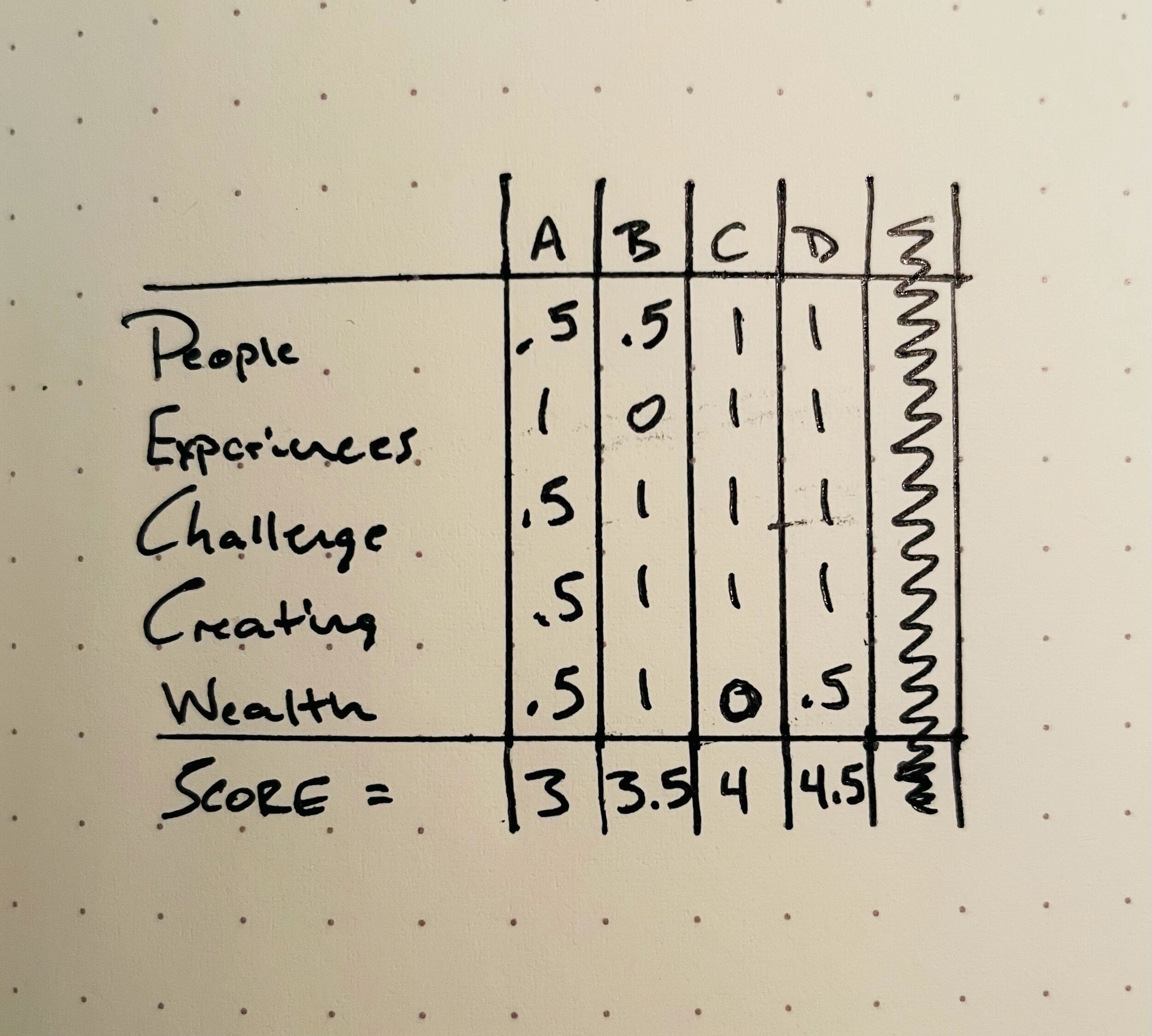What Should You Work On?
Julian Shapiro is one of the best writers online. His writing is consistently the highest value-per-word that I follow for marketing, thinking, and career decisions. These thoughts are regularly posted as Twitter threads, occasionally as blog posts, and rarely compiled into handbooks.
He wrote a new blog post that walks through a framework we can use to choose how to focus on the right goals when beginning a new project. Julian discusses vanity metrics. Vanity metrics are visible, easier to achieve and share, and far from our ultimate goal. These include the number of likes, follows, website visitors, and hours worked. It’s a lot easier to talk about the number of hours you have worked on a difficult project than it is to complete it and point to a valuable finished product. We should let output be our signal instead of credentials.
“We inherit society’s most visible goals, then we don’t challenge them...Life is not about putting in the hours but about seeing results and enjoying the journey.”
Another post of his I enjoyed is about choosing what to work on. Vanity Metrics discusses how we focus and Life Planning covers what we should focus on. They work well together like choosing the right vessel and then which direction to head. It’s best to figure out where you want to go before deciding how to get there.
In the Life Planning post Julian presents an exercise that helps anyone figure out what they should be working on. It inspired me to practice for myself.
This write-up is my take on Julian’s exercise! I lay out what the top 5 values are for me when considering projects and career opportunities. From there I rank the past four opportunities that I acted on in my work-life as a testing ground. I’m doing this exercise based on career opportunities. If I were doing it for my entire life, values relating to my faith and more specifically my family, would rank near the top.
Julian uses the values of Knowledge, Adventure, Fame, Power, Money, Exercising Talent, and Human Connection for himself. The list of values to choose from is much more extensive. You need to think and choose for yourself which items you value based on how your time, money, and energy are spent. A few of the values I chose are similar to Julian’s, as his list is a really great place to start. Here we go.
My top 5 Values:
People
Experiences
Challenge
Creating
Wealth
People
Relationships are most important. All things in life boil down to the relationships you choose to keep. These should be positive, deep, regular, and challenging. It’s a common cliche, but life really is too short to work with assholes. If I have the choice between the two I will always lean towards working for and with people I respect. Those that act kindly and are professional. Of course, we usually have only an interview impression to go on so it’s likely we can be fooled into working with bad people. In these cases, I hope to recognize quickly and act accordingly to not associate myself and my reputation with them. The ideal is working with people that care about you, the work they produce, and people that you care about.
Experiences
A sense of adventure is key to remaining excited and motivated at a sustainable level. Memorable experiences that lead to good stories are more valuable to me than any new possession.
Challenge
An opportunity that really excites me will be one that uses the skills and talents I have and forces me to learn more, quickly.
Work that pushes my curiosity and increases my knowledge of a subject that I’m experienced in will keep me highly motivated and open-minded.
Creating
I want to have skin in the game. It’s important to me to have some control over the final output and direction. I want to have a tangible sense of helping create something new in the world. Ideally, I can point to something that without some effort from myself wouldn’t exist otherwise.
Wealth
This is not necessarily financial wealth but it’s usually correlated. That said, I want to have true wealth in a few areas of my life. The most important areas are time and freedom. I work best knowing I can spend my time in the most effective way. I don’t want to be expected to be “in-seat” for certain hours unless I have a say on what the hours are and depend on what’s best for the work, they are aligned.
Spending normal time each day with my family is crucial. Running errands, cooking a meal, packing lunch, tummy time with Caroline; these are the times that I treasure.
Lastly, making enough money that allows and encourages certain opportunities for me, my family, friends, and community will keep me engaged and feeling appreciated.
*Caveat on money. Yes, financial benefits are weighed carefully and are important to open up opportunities in other areas of life. It’s been a complicated relationship for me over the past years. There have been times when I’ve valued it near the top and other times when I didn’t consider its impact at all. Neither is a good answer. I’m writing this for today. Today, I’m luckily in a place where money is a regular thought, but each time I reflect I can confidently answer that it’s not the main driver in my daily happiness or fulfillment.
So, how does this exercise work? I rank each opportunity based on these values and see how they add up. 0 means that the value is not present at all. .5 means there is potential for the value to present itself but will depend on effort or change. 1 means that the value is a meaningful part of the work that I will benefit from regularly.
To recap:
0 = no
.5 = small potential
1 = yes
A perfect score is 5. Rank each opportunity, tally up the score and pursue the highest without regret...until the next fork in the road presents itself.
Julian's thinking pairs well with 5 questions that Clayton Christensen suggests for evaluating any new career opportunity in his wonderful book, How Will You Measure You're Life. I have referred back to these questions for every career opportunity I've had since I read the book five years ago. You may not be able to answer 'yes' for all five when considering a new job, but it's useful to view the position with them in mind. Here they are for your reference:
Is this work meaningful to me?
Is this job going to give me a chance to develop?
Am I going to learn new things?
Will I have an opportunity for recognition and achievement?
Am I going to be given responsibility?

